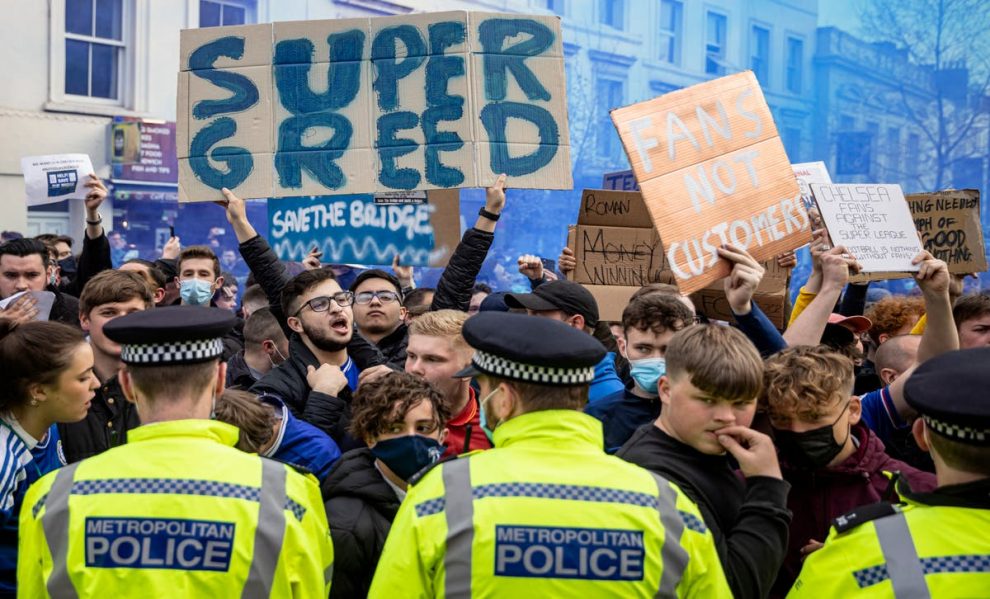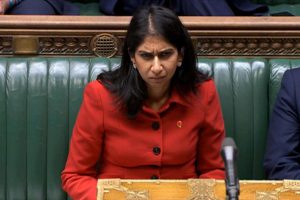There have probably been more successful sporting innovations in recent years than Monday’s launch of the European Super League.
Amid great fanfare, the self-defining ‘Big Six’ of English football; the two Madrid teams plus Barcelona; both Milan’s clubs, and Turin’s Juventus (easily the most hated team in Italy, whose supporters are cruelly referred to as ‘Gobbi’, meaning ‘hunchbacks’) announced the creation of a new, mid-week tournament in which the best in European football would play the best, thereby generating immense revenues that would trickle down and enrich the whole European game. That, at least, is how they tried to sell it.
The Super League was plotted by Real Madrid’s president Florentino Perez, Juve boss Andrea (Il Gran’ Gobbo) Agnelli, and the American waxworks who own Manchester United and Liverpool. In reality, they weren’t announcing a competition but a coup.
It was designed to smash the authority of UEFA and of national regulatory bodies like the FA, and to bring the big money –that follows football as Eric Cantona’s seagulls follow the trawler– directly into the net of the wealthiest clubs. Banking giants JP Morgan were primed to pump £3.5 billion into the twelve founding teams, as an advance on an anticipated tsunami of TV revenue.
Perez and his cronies wanted to become bosses by whacking the boss. And if you’re going to do that, you’d better make sure you shoot straight. Instead, the Super League coup fathomed new depths of insurgent incompetence, rivalled only by Sir Mark Thatcher’s attempted job on Equatorial Guinea in 2004, or that time when Ian Duncan Smith and Jacob Rees-Mogg tried to nobble Theresa May.
Whatever the point of the European Super League, it wasn’t football. As was famously said about the Holy Roman Empire, The European Super League wasn’t European (consider the absurdity of launching a European championship with no Bayern München or Paris St Germain), wasn’t super (not with Spurs as a founder member) and wasn’t, without the prospect of poorly-performing clubs dropping out, much of a league either (though perhaps there’s no need for formal relegation when the same degree of ignominy could be achieved by any of the other teams falling below Spurs in the table).
Twelve clubs playing each other in a merry-go-round without the jeopardy of relegation stretched accepted definitions of ‘competition’ to almost the same extent that the presence of Tottenham Hotspur stretched the definition of ‘élite’. This, and the undisguised financial rapacity of its central premise, did not make the Super League a popular concept among football supporters.
If Perez, Il Gran’ Gobbo, and the Glazers hoped that Monday’s announcement would force the hand of big clubs across the continent, prompting other owners to leap up and yell “I am Spartacus”, these hopes were dashed. The opposite happened.
The fledgling Super League flew directly into one of the biggest shitstorms in sporting history. Fans across Europe went postal. Politicians lined up to hurl abuse at the rebel clubs. UEFA and the FA retaliated with dire, and almost certainly unenforceable, menaces to bar Super League participants from European championships, and to ban those clubs’ players from representing their home countries on the pitch.
The Super League was going down fast, and –at 7pm on the day of its launch– Chelsea FC were the first rats to jump ship. Twenty minutes later, Manchester City scrambled to safety, followed by seven more of the twelve participating clubs. The coup had failed.
It is hard to recollect anything, including the recent death of HRH The Duke of Edinburgh, that has provoked such a universal outburst of political consensus. Everybody, absolutely everybody, hated the Super League. It’s not entirely clear on what basis Her Majesty’s Government is entitled to tell the owners of Association Football clubs what to do with their playthings, but Boris Johnson (no doubt seeing that it was going thundering down anyway) vowed to stop the Super League, threatening to impose a ‘legislative solution’ if the clubs persisted.
Boris has never sounded particularly convincing when talking about football. More convincing, it’s true, than David Cameron, who couldn’t tell one end of a football from the other and came horribly unstuck in a 2015 speech when, after years of pretending to be an Aston Villa fan, he forgot the name of the team his spads briefed him to say he supported and cheered on West Ham.
But unlike Cameron, the PM has an astute instinct for popular sentiment, and is careful not to find himself on the wrong side of it. Many of the clubs who stood to lose out if the Super League had gone ahead are in ‘red wall’ Tory (or Tory target) seats. Allowing big money and the forces of globalism to wash over the English game, and potentially sweep away the community and tradition of those clubs, would have been politically unwise.
Perez has warned darkly that the whole lot of them signed a binding and enforceable contract to set up the Super League, and that they will be held to their obligations. “If anyone thinks the Super League is dead,” he told reporters on Wednesday, “are they wrong? Absolutely.”
He may be right that the Super League is not dead, in just the same way that Frankenstein’s monster was ‘not dead’. Money, like the monster, is resilient. It’s unlikely that we have seen the last of the European Super League, or something very like it.




















Add Comment